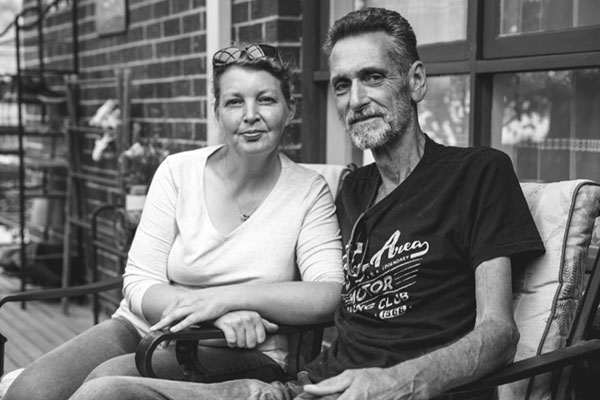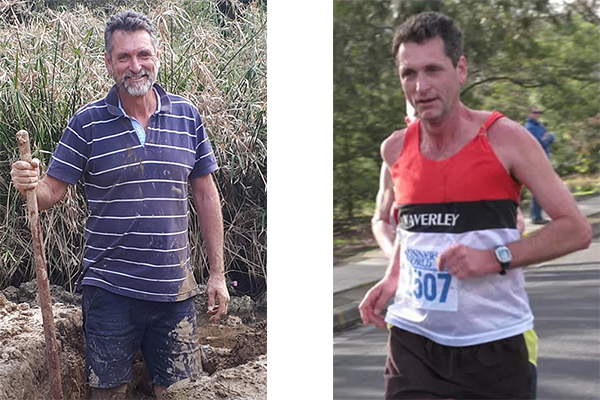
Photo caption: Klarissa and Warren, the day before he passed away from blood cancer.
In Victoria, each year less than six percent of people diagnosed with cancer participate in a clinical trial, and this is lower for people living in rural and regional areas.
Warren was a shire ranger at the Mornington Peninsula Shire for 25 years and was an ultra-marathon runner who ran for Australia.
“He was always lean, fit, leggy, ate like a horse, ate everything in sight and he was never really one to get sick,” recalled Klarissa, Warren’s partner.
When he was diagnosed with Diffuse Large B-cell Lymphoma (DLBCL) at the age of 58, it came as a shock. DLBCL is a type of blood cancer - an aggressive type of non-Hodgkin lymphoma that develops from the B-cells in the lymphatic system.
“In August 2019, Warren had a cold and he couldn’t really shake it and he’d gotten a nasty cough on top of that,” Klarissa said. “He’d gone to the doctors and done a course of antibiotics.
“When he started to cough up a bit of blood, I said, “Go back for a chest x-ray in case you’ve got pneumonia or something like that. And that’s when it came back with the two masses on both sides of his lungs.
“He had a lung biopsy, blood tests and CT scan and that’s when it came back with DLBCL. Unfortunately, it was Stage four, which seems to be what happens with these ones, it’s more commonly detected in the later stage.”
Warren was started on a combination of drugs called R-CHOP that work together to target and kill cancer cells.
“He did four infusions at Monash Health before they decided it wasn’t working - there was no change at all,” Klarissa said.

Photo caption: Warren was fit and active before his cancer diagnosis.
Starting clinical trials
At this point, it was recommended that Warren explore clinical trials to undergo promising new treatments for his type of cancer.
He was referred to Peter MacCallum Cancer Centre to find out if he qualified for CAR T-CELL Therapy (The Belinda Trial) - a new form of immunotherapy that uses the patient’s own immune system to destroy cancer cells. It works by taking T-cells from the patient’s blood, specially altering them in a lab overseas and then returning them to the body to directly target cancer cells.
Perhaps not well-explained to Klarissa and Warren at the time, was that it was a randomized clinical trial. This means a computer was used to randomly assign patients to receive CAR-T therapy or standard treatment. This is done to ensure the trial results will be reliable and prevents false results due to unconscious bias.
“I don’t think there’s enough emphasis made on explaining to people that there are no humans that decide which treatment you’re assigned to – a computer does it,” Klarissa said.
One of the side effects that Warren experienced from CAR-T were tumor flares. The lymph node in his neck reacted the worst, causing him to have controlled falls.
“The minute he put his hands above his head, he would pass out.”
Warren underwent a week of radiation during the trial to assist with the flares, after the clinical trials team in Australia sought permission from the drug company in Switzerland. The problem was that any interference to the trial protocols meant he would lose his spot. The company agreed, as long as it was on the neck lymph node. It effectively saved his life.
“They told us CAR-T has only a 40 percent success rate,” said Klarissa. “So, in the 40 percent of people that do have it, it works very well, in the rest it does either nothing or it’s very minor. Sadly, it didn’t make a difference for Warren, other than giving us a little more time.”
Warren went on to participate in a number of clinical trials at both Peter MacCallum Cancer Centre and Austin Health including a Bispecific T-cell engager antibody trial that involved three weeks of radiotherapy.
“He signed off on every bit of paperwork that he could to get extra testing done, to benefit people in the future,” Klarissa said.
“His theory was that even though none of this worked completely for him, we would learn something from it.
“Warren also participated in two phase 1 trials, a remarkable accomplishment with many unknowns for us.”
Impact for regional patients during COVID-19
Warren received treatment during the COVID-19 pandemic when Victoria went into lockdown, hospitals restricted visitors and many support services such as transport to treatment were suspended.
“COVID made it that much harder,” Klarissa said. “The whole place just got locked down and we couldn’t go anywhere. Even the primary carer couldn’t be with the patient. I had to insist that when he was having his consultations that they put me on the phone as well.”
Travelling from a farm on the Mornington Peninsula for treatment in Melbourne also came with added complications.
“Accommodation was an issue as all the hotels shut down, we couldn’t stay with friends and there were no ride-share or patient transport that would get Warren from the farm into the hospital and then back again,” she said.
“One day I spent eight hours in the underground carpark at the Austin waiting for Warren to have his treatment. It was terrible. I tried to use the toilet over the road in the train station and the police turned me around and sent me back. We took that back to the Austin and that was when they got me a room at the Ryder Cheshire Homes.
With Warren needing care and help getting to appointments, Klarissa took leave from work.
“It takes up your whole life,” Klarissa said. “One of the trials involved a month of radiation – that’s driving an hour in for 15 minutes of radiation and driving an hour home. A lot of the time we were doing 800 kilometers a week.
“It’s hard for people coming from regional areas, especially from the people I’ve spoken to who are still running farms and things like that. It means you both can’t go. I never missed an appointment we were in it together.
“Cancer took away his ability to do the things he loved for himself.
"He went from being a person who could do everything including working on the farm, to not being able to anything. Having someone say to him, “You can’t drive anymore,” is a really big thing. It takes away another part of your independence.
“We spent time finding things he could do, because he needed to feel useful too – like setting up camp chairs all over the farm so that he could walk 20 steps and then if he wanted to have a break he could.
“We put a camp chair out near the clothesline – it didn’t matter if it took him four hours to hang out the washing, as long as he was out there sitting in the sun.”
Advice for other patients and carers
Klarissa and Warren found the Victorian Cancer Trials Link website a helpful resource for finding and learning about available clinical trials.
“What I found good about this is, that when you’re sitting there trying to absorb all these trials and technical terms and everything from the doctors, the site meant you could just read about it in layman’s terms,” said Klarissa.
“It was good for Warren too. He was able to get online and have a read at his own leisure and think about the questions he wanted to ask when we went back for his next visit.”
While many incidental costs like parking, petrol and food were covered by the treating centers conducting clinical trials, medication wasn’t.
“It’s really just the medication that we had to buy, which is the expensive bit,” Klarissa said.
“Specialty foods like Sustagen are never cheap either and then being really careful about infection so throwing out toothbrushes, toilet brushes, dishcloths, sometimes weekly, and definitely after every infusion, and constantly doing loads of washing because they get night sweats. Little things like that add up.”
Looking back at their experience, Klarissa would recommend clinical trials to others considering taking part.
“I think you should embrace clinical trials,” she said. “If someone’s offering you a lifeline and the patient wants to have a go, then have a go and if it doesn’t work, we’ve still learnt something from it”.
“I can’t fault them, because it gave us longer than we would have had. If we hadn’t done it, he would have been gone well before then. We would have had six months instead of 15.
“I think it’s an amazing opportunity, we just need more of it in Australia.”
Warren’s legacy
Sadly, Warren passed away from cancer on 22 November 2020 after courageously facing multiple rounds of treatment and clinical trials. He’s survived by his adult children Clare, Elizabeth and Michael, siblings Pam, Mandy, Greg and Brian and partner Klarissa.
Warren is never far from Klarissa’s mind. Also an employee at Mornington Peninsula Shire, Klarissa only needs to raise her head to see the photos of him pinned to the walls of the partition of their work area.
“Warren always put his hand up for any extra tests and could never understand why more articles about clinical trials were not discussed in the media,” said Klarissa.
Warren wanted to get the word out about clinical trials and for that reason Klarissa reached out to Cancer Council Victoria to see if she could help. Sharing experiences like this, helps other people considering clinical trials and helps the healthcare sector and policy makers make improvements to benefit others affected by cancer.
Investing in clinical trials
Cancer Council Victoria is committed to improving participation and reducing inequities in access to cancer clinical trials in Victoria. One of the ways we’re doing this is by investing in clinical trials to foster innovative research that save lives.
Learn more